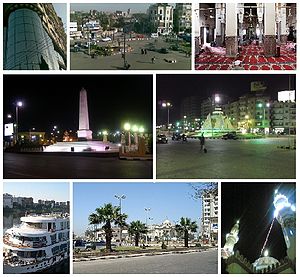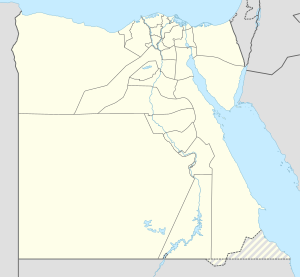Sohag
|
Sohag سوهاج (Arabic) |
||
|---|---|---|
| City | ||
 |
||
|
||
| Nickname(s): Bride of the Nile | ||
| Location in Egypt | ||
| Coordinates: 26°33′N 31°42′E / 26.550°N 31.700°ECoordinates: 26°33′N 31°42′E / 26.550°N 31.700°E | ||
| Country |
|
|
| Governorate |
|
|
| Markaz |
|
|
| Government | ||
| • Governor | Waddah Hamzawy | |
| Area | ||
| • City | 68 km2 (26 sq mi) | |
| Elevation | 61 m (200 ft) | |
| Population (2012) | ||
| • City | 201,339 | |
| • Rank | 20th in Egypt | |
| • Density | 3,079.69/km2 (7,976.4/sq mi) | |
| • Metro | 600,000 | |
| Demonym(s) | Sohagi / Sohagy | |
| Time zone | EET (UTC+2) | |
| Postal code | 82749 | |
| Area code | +20 (Egypt) 93 (City) | |
| Website | www.sohag.gov.eg/ (Arabic) | |
Sohag (Arabic: سوهاج, Saidi pronunciation: [suːˈhaːdʒ] Sūhāǧ, Egyptian Arabic pronunciation: [soˈhæːɡ] Sohāg), also known as Sawhāj, Suhag and Suhaj, is a city in Egypt that lies on the west bank of the Nile. It has been the capital of Sohag Governorate since 1960. Prior to that, the capital was the city of Girga and the name of the governorate was Girga Governorate. It also included Esna Governorate (nowadays Qena Governorate).
Until the 19th century there was only a village located in the area. In 1960, the capital of the Governorate of Girga was transferred from the city of Girga to growing city of Sohag. The name of the governorate was renamed accordingly.
It is unclear how long this site has been inhabited. There are several mummies here that date to Roman times, the village. In Coptic times, there was a community of monks living at the White Monastery in the area.
The 10th of April is the national day of the governorate to celebrate the victory of the Egyptian national resistance troops on the French troops in Johaina Battle in 1799.
Sohag lies on the western bank of the Nile on a fertile agricultural plain, approximately 6 kilometres (3.7 miles) southwest of Akhmim. In addition, the city includes two islands, Karaman-ez-Zahur Island, which is larger and uninhabited, and ez-Zahur Island (جزيرة الزهور, Ǧazīrat az-Zuhur, "Flower Island") which has some homes.
The city Sohag of itself encloses only a few archaeological sites, hence tourism represents but a small portion of the city's income. Other sources of income include trade, small industries of carpets, furniture, spinning and weaving and sugar. Administrative and educational services are two big sectors of income.
...
Wikipedia


